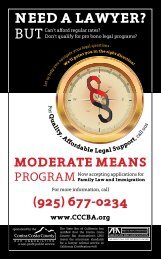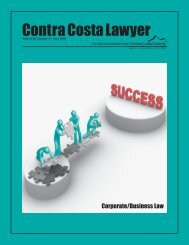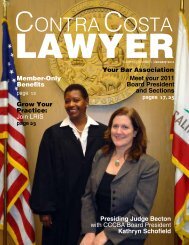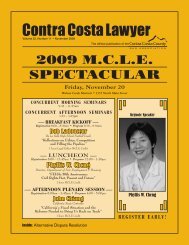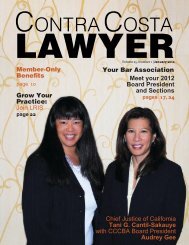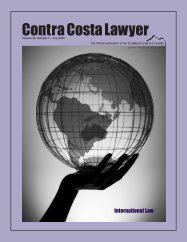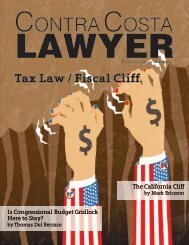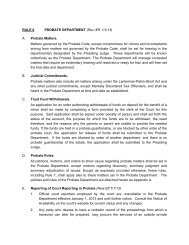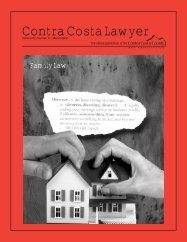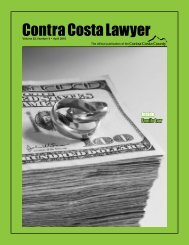download - Contra Costa County Bar Association
download - Contra Costa County Bar Association
download - Contra Costa County Bar Association
- No tags were found...
You also want an ePaper? Increase the reach of your titles
YUMPU automatically turns print PDFs into web optimized ePapers that Google loves.
ethics cornerThe Good, the Badand the Ugly WithOnline Reviewsby Carol LangfordAsearch on the businessrating site Yelp for attorneysin San Franciscoyields 5,681 results. AlthoughYelp and similar sites areprobably best suited for restaurantsand night clubs, many people usethe site to review professionals.These reviews influence potentialclients. The Lawyerist.com, a blogfor legal professionals, recentlypolled a thousand people with thequestion: “When you need to finda specialty lawyer, how would youstart your search?” Twenty-two percentsaid that they search Google oranother search engine, 10 percentsaid that they “look elsewhere onthe internet” and 2 percent said thatthey “ask on my favorite social network.”Yelp is not the best indicator of anattorney’s ability—but most peopleusing Yelp don’t know that. Mostexperiences with Yelp reveal thatgenerally bad restaurants get badreviews and good restaurants getgood reviews. However, some placesof business and now some attorneyseither pay people to write goodreviews or ask their dearest friendsto rate their lawyering skills online.Thus, inexperienced lawyers whoare savvy with social networkingcan have outstanding reviews andmore seasoned, but less Internetsavvy,attorneys can have bad reviewsand not even know about it.In some instances, attorneys mightbe rated for things that have nothingto do with their legal abilities.There is really no way to tell whysomeone rated a particular attorneywith high marks.However, the troubling questionis, what can a lawyer do to fightback when he or she receives a negativereview on Yelp? Accordingto some ethics experts: not much.In the Los Angeles <strong>County</strong> <strong>Bar</strong> <strong>Association</strong>’sFormal Ethics Opinion#525, the authors concluded thatany public response to a negativereview online must not “discloseconfidential information,” must“not injure the former client in anymatter involving the prior representation”and must be “proportionateand restrained.” The part about notdisclosing confidential informationcan leave attorneys at a huge disadvantagewhen responding online.Because opinions are protectedby the First Amendment, clients are“The troubling question is, what can a lawyer do to fight back whenhe or she receives a negative review?”usually within their rights to logonto social media sites and trashtheir attorney, as long as they don’tknowingly make false statements—a hard standard to prove. Furthercomplicating matters is the attorney-clientprivilege, which restrictsthe attorney as to what he or shecan say to respond, if that requiresdivulging privileged information.For instance, imagine a client thathired a personal injury attorneywith unreasonable expectationsof receiving millions of dollars insettlement, or a client that endedup slighted in a divorce settlementbecause of his or her own bad behavior.The client could then go onYelp, Avvo, LawyerRatingz.com,Angie’s List, etc., and tell the worldthat the attorney botched the case.In this situation most people wouldreasonably want to defend themselvesagainst these accusations bypointing out the client’s own badbehavior. But as lawyers we cannot.So what can we do?A professional can always sueover a bad review for defamation—30MAY 2013



